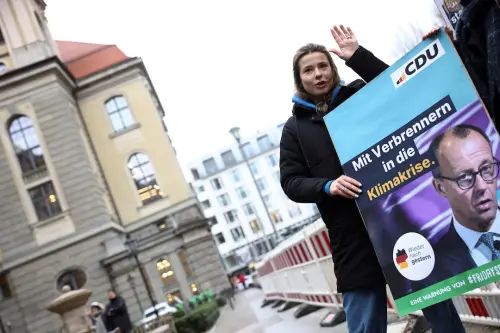Berlin, March 7 - Climate activists are concerned about the future joint climate policy of Germany's conservatives and Social Democrats as they navigate their new coalition government. Germany, once a pioneer in progressive climate initiatives, is now undergoing a significant shift due to some blaming ambitious green goals for economic challenges. This shift may lead to a rollback of climate targets and policies amidst a growing indifference among voters regarding climate issues.
As Europe's largest CO2 emitter and renewable energy producer, Germany's stance on climate will be crucial following the U.S. withdrawal from the Paris Agreement and pressure within the EU to relax regulations. Luisa Neubauer, a prominent German climate activist, expressed concerns, stating, "If there was ever a time to panic about climate and politics, now would be it."
While the CDU remains committed to Germany's goal of climate neutrality by 2045, they stress a pragmatic approach supporting the economy. Conversely, the SPD's defense of their green election pledges, such as adhering to climate targets and investing in green initiatives, will be pivotal in coalition talks. However, with the SPD's weakened position in the recent election, there may be challenges in upholding these promises.
The decline in climate protection as a top priority for German voters, driven by a cost-of-living crisis, has complicated efforts to expand net-zero policies. Despite the challenges, Germany's influence within the EU, particularly through the EPP, could impact the bloc's climate rules.
The conservatives' climate strategy heavily relies on CO2 pricing, subsidies, and enabling rather than regulating excessively. The upcoming EU emissions trading system expansion is expected to incentivize reductions in emissions. Yet, potential affordability crises may arise if prices escalate.
To achieve climate neutrality by 2045, Germany must invest substantially in climate protection measures annually. Though the conservatives and SPD agreed on a significant infrastructure fund, clear climate-focused investments are lacking. Additionally, the conservatives' proposed tax cuts raise concerns about ensuring a fair and affordable climate transition, particularly for lower-income individuals.
The expectation of subdued climate action under a conservative-led government might lead to heightened legal challenges and activism. Various protests and demonstrations have already emerged, indicating growing societal pressure for robust climate policies in Germany.
